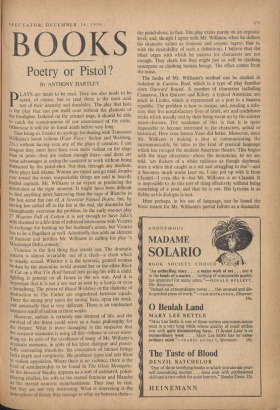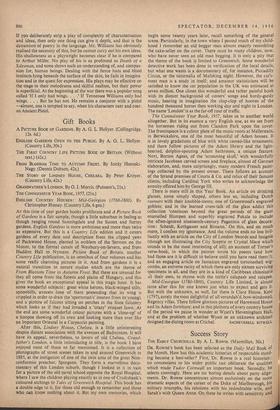Poetry or Pistol ?
BY ANTHONY HARTLEY pLAYS are made to be read. They are also made to be acted, of course, but to read them is the most acid test of their intensity and durability. The play that lasts is the play that can put itself over without the glamour of the footlights. Isolated on the printed page, it should be able to catch the consciousness (if not conscience) of the critic. Otherwise it will die its tinsel death before very long.
That being so, I make no apology for dealing with Tennessee Williams's latest volume (Four Plays : Seeker and Warburg, 25s.) without having seen any of the plays it contains. I can imagine they must have been even more violent on the stage than in print—they are violent enough there—and there are , line advantages in seeing the conjuror at work without being distracted by the pistol-shot. Not that, through any medium, these plays lack drama. Women are raped and go mad, drunks roar round the room, unspeakable things are said in heavily leaded capitals. Mr. Williams is an expert at producing the Pistol-shot at the right moment. It might have been difficult to find anything more harrowing than the rape of Blanche in the last scene but one of A Streetcar Named Desire, but, by having her carted off to the bin at the end, the dramatist has triumphantly overcome the problem. In the early one-act play 27 Wagons Full of Cotton it is not enough to have Jake's wife doomed to a life-time of enforced intercourse with Vicarro in exchange for hushing up her husband's arson, but Vicarro has to be a flagellant as well. Admittedly this adds an element of humour and justifies Mr. Williams in calling his play 'a Mississippi Delta comedy.' Violence is the first thing that stands out. The dramatic Pattern is almost invariably one of a clash—a clash which is usually sexual. Whether it is the neurotic, genteel woman broken by the masculine world around her or the effete Brick of Cat on a Hot Tin Roof forced into giving his wife a child. lighting is general on all fronts in the sex war. And it is important that it is not a sex war as seen by a Lorca or even a Strindberg. The power of Blood Wedding or the dialectic of destruction in The Father are engendered between equals. There the strong prey upon the strong; here, upon the weak, zind artistically that is very different. There is an unpleasant intrusive smell of sadism in these works.
However, sadism is certainly one element of life, and the survival of the fittest could serve as a basic philosophy for the theatre. What is more damaging is the suspicion that the conjuror dramatist is using all this violence to cover some- thing up. In spite of the excellence of many of Mr. Williams's dramatic moments, in spite of his tense dialogue and power- fully convincing situations, his conception of human beings lacks depth and complexity. He produces types and sets them in violent opposition. Where there is no violence, there is the kind of sentimentality to be found in The Glass Menagerie. In the Streetcar Stanley appears as a sort of animated, poker- Playing phallus, his wife as the eternal feminine and Blanche as the eternal neurotic nymphomaniac. They may be real. but they arc not very interesting. What is interesting is the atmosphere of frenzy they manage to whip up between them— the pistol-shots, in fact. The play exists purely on an orgiastic level, and, though I agree with Mr. Williams when he defines his dramatic values as dynamic and organic (agree, that is, with the desirability of such a definition), I believe -that the blind urges with which he endows his characters are not enough. They clash, but they might just as well be clashing saucepans as clashing human beings. The effect comes from the noise.
The faults of Mr. Williams's method can be studied in isolation in Camino Real. which is a type of play familiar since Outward Bound. A number of characters including Casanova, Don Quixote and Kilroy. a typical American. are stuck in Limbo, which is represented as a port in a banana republic. The problem is how to escape, and, pending a solu- tion, they live unsatisfactory lives of drink, sex and confidence tricks which usually end by their being swept up by the sinister street-cleaners. The weakness of this is that it is quite impossible to become interested in the characters, actual or historical. Here even Sutton Vane did better. Moreover, since Mr. Williams is making a shot at communicating the incommunicable, he takes to the kind of poetical language which has ravaged the modern American theatre. This begins with the stage directions—above the mountains, go we are told, 'are flickers of a white radiance as though daybreak were a white bird caught in a net and struggling to rise'—and it becomes much worse later on. I can put up with it from Claudel—I even like it—but Mr. Williams is no Claudel. It is impossible to do this sort of thing effectively without being something of a poet, and that he is not. His lyricism is as flabby as his dialogue is taut.
Here perhaps, in his use of language, can be found the basic reason for Mr. Williams's partial failure as a dramatist.
If you deliberately strip a play of complexity of characterisation and ideas, then only one thing can give it depth, and that is the dynamism of poetry in the language. Mr. Williams has obviously realised the necessity of this, but he cannot carry out his own ideas. His shallowness as a playwright becomes clear if he is compared to Arthur Miller. No play of his is as profound as Death of a Salesman, and none shows such an understanding of, and compas- sion for, human beings. Dealing with the fierce lusts and blind instincts lying beneath the surface of the skin, he fails in imagina- tion and in the quest for expression. His plays may be effective on the stage in their melodrama and skilful realism, but their power is superficial. At the beginning of the war there was a popular song called 'If I only had wings. . . If Tennessee Williams only had wings. . . . But he has not. He remains a conjuror with a pistol —almost, one is tempted to say, when his characters rant and roar. an Ancient Pistol.











































 Previous page
Previous page